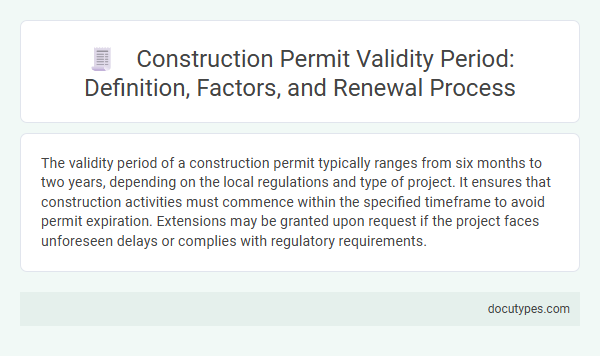The validity period of a construction permit typically ranges from six months to two years, depending on the local regulations and type of project. It ensures that construction activities must commence within the specified timeframe to avoid permit expiration. Extensions may be granted upon request if the project faces unforeseen delays or complies with regulatory requirements.
Introduction to Construction Permit Validity Period
The validity period of a construction permit refers to the timeframe within which the approved construction activities must commence and be completed. This period ensures that construction projects adhere to current regulations and zoning laws. Understanding the permit validity is essential to avoid penalties and project delays.
Defining Construction Permit Validity Period
The validity period of a construction permit refers to the timeframe during which the permit holder is authorized to begin and complete construction activities. This period is set by local building authorities and varies depending on jurisdiction and project scope.
Defining the construction permit validity period ensures that construction complies with current codes and regulations. It typically ranges from six months to two years, but extensions may be possible if requested before expiration. Knowing your permit's validity period helps avoid project delays and potential penalties.
Importance of Permit Validity in Construction Projects
The validity period of a construction permit defines the timeframe within which construction activities must commence and be completed according to legal regulations. Understanding the permit validity is crucial for effective project planning and compliance in construction projects.
- Ensures Legal Compliance - A valid construction permit guarantees that the project adheres to local building codes and regulations, preventing legal penalties.
- Facilitates Project Scheduling - Knowing the permit's expiration date helps in organizing construction phases and resource allocation efficiently.
- Prevents Financial Risks - Avoiding permit expiration reduces the risk of costly delays, fines, and the need to reapply for permits during construction.
Key Factors Influencing Permit Validity
The validity period of a construction permit typically ranges from six months to two years, depending on local regulations and the scope of the project. Key factors influencing permit validity include the type of construction, project size, and compliance with zoning laws. Extensions may be granted if work is delayed due to unforeseen circumstances or additional approvals are required.
Legal Framework Regulating Permit Validity
The validity period of a construction permit is strictly governed by national and local legal frameworks to ensure compliance with building regulations and safety standards. These laws define the time limits within which construction must commence and be completed to maintain the permit's effectiveness.
- Legal Statutes Define Time Limits - Construction permits typically have a validity period ranging from six months to two years, as stipulated by relevant building codes and municipal regulations.
- Renewal and Extension Provisions - Laws often provide options for permit renewal or extension, contingent upon demonstrated progress and adherence to initial permit conditions.
- Consequences of Expiration - Expired permits require reapplication or corrective action, with legal consequences for unauthorized construction beyond the validity period to enforce regulatory compliance.
Common Duration of Construction Permit Validity
What is the typical validity period of a construction permit? Construction permits commonly have a validity period ranging from six months to two years. This duration allows sufficient time for project commencement and progress without frequent renewals.
Implications of Permit Expiry on Construction Activities
The validity period of a construction permit typically ranges from six months to two years, depending on local regulations and the project scope. This timeframe defines how long you can legally begin and continue construction activities without renewing the permit.
Permit expiry means construction must halt until a renewal or extension is granted, affecting project timelines and potentially increasing costs. Failure to comply with permit validity can result in fines, legal issues, and forced demolition of unapproved work.
Situations Requiring Permit Renewal
The validity period of a construction permit typically ranges from six months to two years, depending on local regulations. Expiration occurs if construction does not commence or progress within the designated timeframe.
Situations requiring permit renewal include project delays, changes in construction scope, or failure to meet inspection deadlines. You must apply for renewal before the permit expires to avoid penalties or project shutdowns.
Step-by-Step Process for Construction Permit Renewal
The validity period of a construction permit typically lasts between 6 months to 2 years, depending on local regulations and project scope. Knowing the renewal process is essential to avoid work interruptions and legal issues.
- Check Expiry Date - Review your construction permit to identify the exact validity period and expiration date.
- Submit Renewal Application - File a renewal request with the relevant municipal or building authority before the permit expires.
- Provide Required Documentation - Include updated project plans, inspection reports, and any fees necessary for permit extension.
You should initiate the renewal process well in advance to maintain continuous authorization for your construction activities.
What Is the Validity Period of a Construction Permit? Infographic

